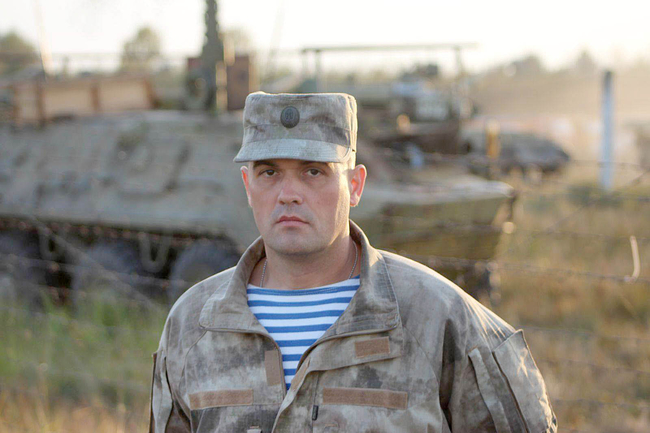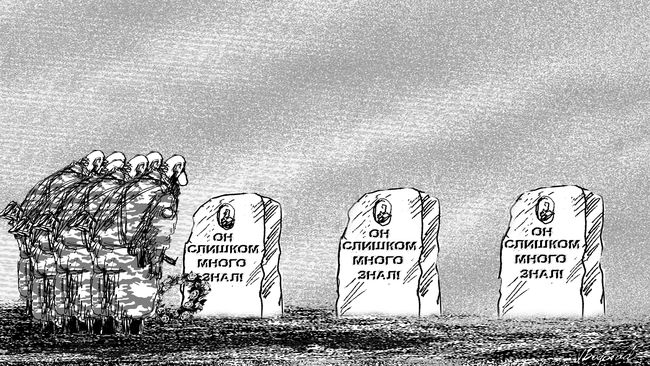What punishment should be meted out to ones like Givi?
Serviceman Oleh KUZMINYKH: “The best option for Ukraine would be to apprehend and publicly try criminals and then make their testimony known to the world community”
In late 19th century photography, there was a tradition called post mortem. It involved taking pictures of dead people before they were buried forever. When the Russian aggression against Ukraine started and Russia occupied parts of our territory, Den/The Day stated clearly that the Kremlin would eliminate the perpetrators of this crime. Indeed, they have been doing it in a gradual and systematic manner, so that when looking at pictures of the current leaders of the Russian thug formations, it seems that you look into the eye of dead men walking. In particular, the article “We Need to Liberate the Donbas” (published by Den on December 19, 2014) reads: “This war is divided into visible and invisible dimensions. In the visible war, mortar rounds explode, bullets whistle, and heads fly off in the battlefield. Meanwhile, the invisible war involves targeted assassinations of those who, like Friedrich Schiller’s Moor, have done their work and may go to have some rest now, that is, those who need to have eternal rest. There is serious talk that Russia is systematically eliminating in the occupied territories witnesses and perpetrators of its crimes as well as unreliable individuals who are no longer needed. This creates a springboard not only for entrenching the Russian power in the region for good, but for a possible ‘discreet’ retreat as well, because more than one scenario is in work. Given the economic situation and Igor Girkin’s interesting statements that he and Vladimir Putin might be sent to The Hague to answer for their deeds together at some point, the Kremlin may take some unorthodox steps in the Donbas.” A week after that article appeared, a man known by his nom de guerre as Batman, who had worked as a bouncer at the Kolizei night club before becoming the commander of a Russian thug formation, was killed in his SUV on the outskirts of Luhansk. Subsequent thug deaths in the occupied territories occurred as if in the domino effect. The Russian side was sticking to its tried and tested statements that the deaths were occurring as a result of the attacks committed by Ukrainian sabotage and reconnaissance groups and security services. Of course, such take on the issue can only greatly please Ukrainians, but unfortunately, it is difficult to imagine our security services being so effective. Still, we will not discourage hopes of those who idealize the agency which was effectively being rebuilt from the ground up in the past few years. We will just offer a brief timeline of deaths that befell these latter-day collaborationists: Oleksandr Biednov, Yevhen Ishchenko, Roman Voznyk, Oleksii Mozgovy, Pavlo Driomov, Yevhen Zhylin, Hennadii Tsypkalov, Arsen Pavlov (nom de guerre Motorola), and lately Mykhailo Tolstykh (nom de guerre Givi). Each of these mercenaries, some of whom were, indeed, local hardened criminals while others had to be imported from Russia, had his own path to death. But the common denominator in all these “terrorist attacks” was that they were all executing the Kremlin’s plan of the occupation of Ukraine and thus were WITNESSES of the crimes committed on behalf of Russia by its leadership.
Pavlov-Motorola’s death in an elevator cabin became a high-profile news story past October. After the October 16 explosion, morticians had to literally sew the Russian maniacal killer Motorola’s corpse together one piece at a time; before the war, he liked to be photographed with cut-off goat heads and smear himself with blood. It is worth mentioning that Pavlov’s military “talent” was hyped up in the media well beyond any real achievements. For example, it was he who sent the mercenary cannon fodder to their deaths at the Donetsk Airport, while the Russian regulars stayed in the rear. Unfortunately, pictures from his funeral became a litmus test for the Ukrainian citizenry as well, since many people were uneasy after seeing masses of mourners at the thug’s farewell ceremony. Russia was thus able to use even the mercenary’s corpse for media propaganda, while Ukrainians took the bait and believed that all the residents of Donetsk were really mourning this loss.

THE INSCRIPTIONS READ: “HE KNEW TOO MUCH!” / Sketch by Viktor BOGORAD
Who could have had an interest in removing Motorola from the picture? We must recognize that no murder in the occupied territories of Ukraine or Russia itself can happen without the prior approval of the Kremlin and its professionals of an appropriate level. So it looks like we have the familiar scenario of the 1990s vintage being played out, which involved the police supporting certain gang bosses, while others were either eliminated or allowed to be eliminated. It is important to note that all these bastards were assassinated either in the occupied territories or in Russia itself, i.e., on the turf which is completely controlled by the Kremlin. Before proceeding to the death of Motorola’s accomplice, we ought to mention once again Valerii Bolotov’s characteristic death which befell him in Moscow on January 27, 2017 after he admitted that murders of Luhansk thugs were committed by Russia and its henchman Ihor Plotnytsky. Bolotov’s wife said that he had been poisoned.
So, on February 8, social network users were excited to learn of the assassination of Tolstykh, who was the boss of the gang “Somali.” Of course, the militants accused the Ukrainian security services of killing the former loader turned semi-literate thug. The accusations came even though back after the death of Motorola, people were already expressing the opinion that Givi would be the next to die. Unfortunately, our satisfaction from Motorola and Givi’s deaths is drowned by recognition of the fact that all these people took with them to the grave plenty of evidence of their own crimes and those of the Kremlin.
What does the Kremlin want to achieve by ordering these killings? Firstly, they aim to eliminate the witnesses. Secondly, they do it to show Ukraine and the world that they are throwing out the human garbage, thus paving the way for so-called alternative “representatives of the Donbas,” who should ultimately take part in the still-theoretical future elections in the occupied territories. Advisor to the head of the Security Service of Ukraine Oleksandr Bielov believes that by killing militants, Russia is indeed destroying perpetrators and witnesses of its own crimes. “No other logic can explain it,” he says, “because the Kremlin understands well that sooner or later our case will reach an international court, and these individuals will be dangerous witnesses there.”
Oleh Kuzminykh, the serviceman who was held captive by Russian bandits and humiliated by Givi before TV cameras, commented to The Day: “The fact that Givi was killed, of course, demoralizes the enemy because they know that the same destiny also awaits the others who took arms against Ukraine. But that’s not enough for us. It is important that this evildoer was also an eyewitness of how Russia was establishing the so-called “republics.” When Zakharchenko embarked on his criminal path in Donetsk, there were not many people for him to rely upon. Naturally, he had to count on such figures as Givi and Motorola, who had been hyped up by Russian propaganda. Now he has, of course, a team of his own armed henchmen. But both Givi and Motorola remained witnesses to crimes, money flow schemes, plunder of businesses, and even contacts of militants with some of our officials. The best option for Ukraine would be to apprehend and publicly try criminals and then make their testimony known to the world community. We need an individual who could say officially about how all this happened, and the world community must not shut its eyed to Russia’s war against Ukraine. Givi was not much skilled as a military serviceman. Moreover, other bandit formations were outraged that this person was artificially hyped, as if he were a hero, whereas many people in his detachment had died through his fault. As a not very wise man, Givi bore a grudge against others for being put aside from certain money resources and deprived of the far-fetched glory. He had behaved somewhat inadequately lately. He wanted to have his say. I know for sure that he was in conflict with other militant units. Therefore, he was potentially dangerous by being able to speak out at a certain moment. Russia is just getting rid in this way of the witnesses to its aggression. But his death does not matter much for Ukraine.”
Newspaper output №:
№9, (2017)Section
Day After Day





